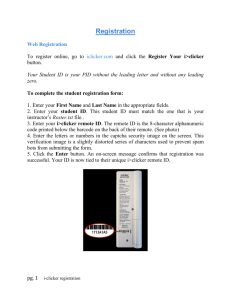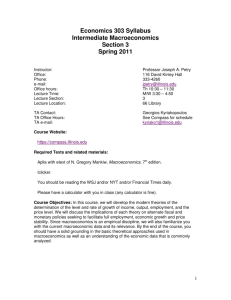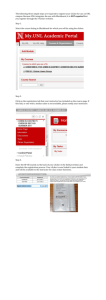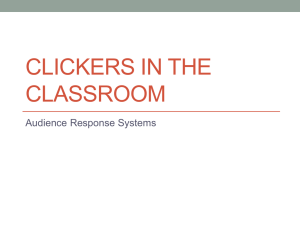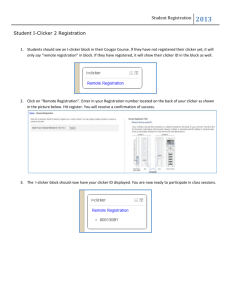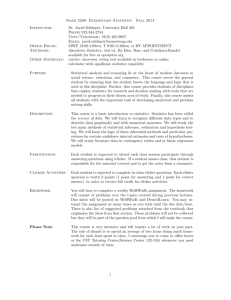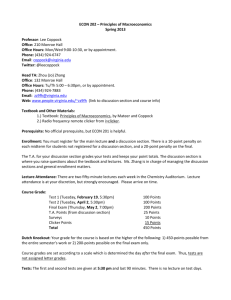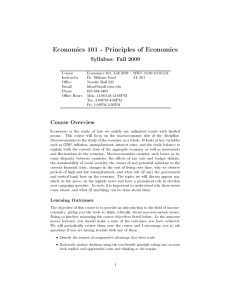Introduction to Macroeconomics 220:103 Section 01 preliminary 8
advertisement
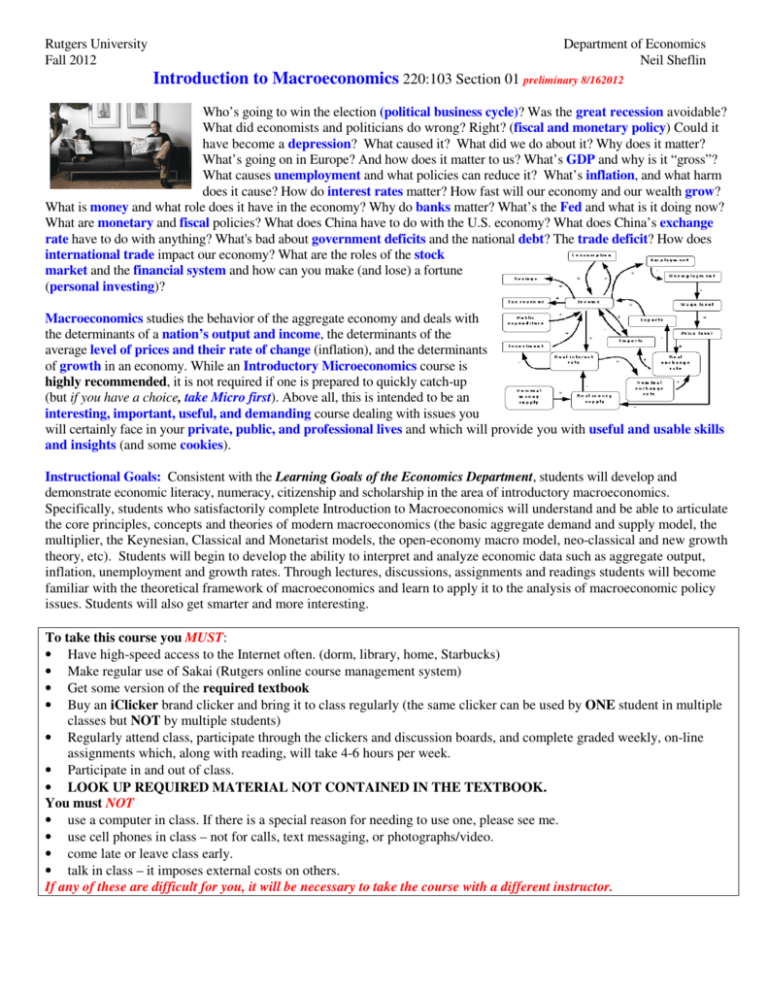
Rutgers University Fall 2012 Department of Economics Neil Sheflin Introduction to Macroeconomics 220:103 Section 01 preliminary 8/162012 Who’s going to win the election (political business cycle)? Was the great recession avoidable? What did economists and politicians do wrong? Right? (fiscal and monetary policy) Could it have become a depression? What caused it? What did we do about it? Why does it matter? What’s going on in Europe? And how does it matter to us? What’s GDP and why is it “gross”? What causes unemployment and what policies can reduce it? What’s inflation, and what harm does it cause? How do interest rates matter? How fast will our economy and our wealth grow? What is money and what role does it have in the economy? Why do banks matter? What’s the Fed and what is it doing now? What are monetary and fiscal policies? What does China have to do with the U.S. economy? What does China’s exchange rate have to do with anything? What's bad about government deficits and the national debt? The trade deficit? How does international trade impact our economy? What are the roles of the stock market and the financial system and how can you make (and lose) a fortune (personal investing)? Macroeconomics studies the behavior of the aggregate economy and deals with the determinants of a nation’s output and income, the determinants of the average level of prices and their rate of change (inflation), and the determinants of growth in an economy. While an Introductory Microeconomics course is highly recommended, it is not required if one is prepared to quickly catch-up (but if you have a choice, take Micro first). Above all, this is intended to be an interesting, important, useful, and demanding course dealing with issues you will certainly face in your private, public, and professional lives and which will provide you with useful and usable skills and insights (and some cookies). Instructional Goals: Consistent with the Learning Goals of the Economics Department, students will develop and demonstrate economic literacy, numeracy, citizenship and scholarship in the area of introductory macroeconomics. Specifically, students who satisfactorily complete Introduction to Macroeconomics will understand and be able to articulate the core principles, concepts and theories of modern macroeconomics (the basic aggregate demand and supply model, the multiplier, the Keynesian, Classical and Monetarist models, the open-economy macro model, neo-classical and new growth theory, etc). Students will begin to develop the ability to interpret and analyze economic data such as aggregate output, inflation, unemployment and growth rates. Through lectures, discussions, assignments and readings students will become familiar with the theoretical framework of macroeconomics and learn to apply it to the analysis of macroeconomic policy issues. Students will also get smarter and more interesting. To take this course you MUST: • Have high-speed access to the Internet often. (dorm, library, home, Starbucks) • Make regular use of Sakai (Rutgers online course management system) • Get some version of the required textbook • Buy an iClicker brand clicker and bring it to class regularly (the same clicker can be used by ONE student in multiple classes but NOT by multiple students) • Regularly attend class, participate through the clickers and discussion boards, and complete graded weekly, on-line assignments which, along with reading, will take 4-6 hours per week. • Participate in and out of class. • LOOK UP REQUIRED MATERIAL NOT CONTAINED IN THE TEXTBOOK. You must NOT • use a computer in class. If there is a special reason for needing to use one, please see me. • use cell phones in class – not for calls, text messaging, or photographs/video. • come late or leave class early. • talk in class – it imposes external costs on others. If any of these are difficult for you, it will be necessary to take the course with a different instructor. MEETING TIMES AND WEB ACCESS TF 11:30-12:50 PM SC-123 College Ave , and online 24/7. My Economics Department web page is: http://econweb.rutgers.edu/sheflin/ - it has a lot of links, some of which you will hopefully find useful. However, virtually all of the course material will ONLY be available through Sakai http://sakai.rutgers.edu . You are responsible for checking announcements, grades, and the chat rooms frequently. HOW THE COURSE WILL WORK • Before each week’s classes, you will read/print the ASSIGNMENT for the next week posted under resources in Sakai, and generally available by the Thursday of the week before it is due (i.e. assignment 2 will be posted by Thursday of week 1) • You will do the textbook and supplementary readings, problems, and online graded multiple choice homework and other assigned items contained in the assignment BEFORE the first class of each week (generally Tuesday) Note that the Supplementary readings are important, the reading may differ from that shown on the syllabus, and it is UP TO YOU TO FIND ANSWERS TO QUESTIONS and problems, even if they are not in the textbook. It is also ESSENTIAL to post questions on the chat rooms and/or ask in class. • You will interact with me and with each other through online chat rooms for homework and other questions you have trouble with, as well as for “when, how, what” questions and other course related issues (email is ONLY for very personal issues) • In class, we’ll deal with current events, applications, homework review for tough questions, all in question format with clickers – there will be little or no lecturing. • We will be playing a stock investing game, and using various simulators and data bases in the course, along with some team projects • There will be a comprehensive, multiple choice final exam at the end of the course covering all the material and counting for the majority of your grade, encouraging to learn the material for the long-run. (ignore Keynes here) GRADING Grades in the course will be based on graded, online, multiple choice homework due before each class (10%), four in-class clicker quizzes (10%) , class participation and testing with clickers every class (10%) and an in-class comprehensive multiple choice Final Exam reflecting what you know at the end of the course (60%).There will also be extra credit projects worth up to 2%. And lesser extra credit for documented attendance at the Learning Resource Center(s). Note that students must earn a grade of C or better in this course to major or minor in economics. Except for documented absence due to participation in official University events or significant illness or personal problems, there will be no excused absences (clicker points). I will drop the lowest clicker day(s), the lowest several homework assignments, and the lowest clicker quiz. Note that students must earn a grade of C or better in this course to major or minor in economics. TEXTBOOK FREE (sort of) The textbook is Principles of Macroeconomics by Libby Rittenberg and Timothy Tregarthen Version: 1.1 April 2011 ISBN (B&W): 978-1-4533-1195-0 ISBN (Color): 978-1-4533-1196-7 (watch out, that’s MACRO not micro and the author is RITTENBERG – all macro books are called macro, check the author and make sure it is mAcro (principles)) This is available: • for FREE to read online http://students.flatworldknowledge.com/course/1072933 (or search for it here: http://students.flatworldknowledge.com/ ) • for $39.95 + shipping (approx. $7) from the same web site, using a credit card or paypal, for a black and white softbound version (click on options and scroll down to find the textbook • $34.95 for ebook, pdf download, on demand on your own (see web site), be careful • It is possible that there are used copies around (check New Jersey Books on Easton Ave) but make sure you are getting the correct book – Principles of mAcroeconomics by Rittenberg and Tregarthen version 1.1 There are a number of ‘standard’ and very expensive Introductory Macroeconomics textbooks. You may wish to pick up a used copy of one as a supplement if you feel you need it. Tow bestsellers are by Paul Krugman (Macroeconomics 2nd or 3rd edition) or Greg Mankiw (Principles of Macroeconomics 4-6th editions) Note that I will not refer to or follow these books. Some students have found them helpful. In addition, Greg Ip’s The Little Book of Economics: How the Economy Works in the Real World, about $12 – a good, policy oriented layman’s treatment of current macroeconomic issues (this will be one of the extra credit choices later in the course). And maybe Paul Krugman’s End This Depression Now –a good introduction to (Krugman’s) macro, also to be on the extra credit list later. iCLICKER We will be using iClicker brand clickers which sell for about $33 new, with many available used for less. You MUST have your own clicker – it cannot be shared even with a friend in a different class, but it can be bought used, or borrowed from someone who is not using it this semester. You must bring your clicker to every class and must not bring someone else’s – there will be frequent checks for clickers that are in class when their owners’ are not. There is a new model - iClicker2 (small screen, alphameric entry) – you need not buy this if you already have a iclicker. If you do not have an iclicker, you can buy either iclicker1 or iclicker2 (the only advantage of iclicker2 for you is possible use in future courses that may require it; it should sell new for about $5 more than the original iclicker). Note there is an iClicker+ coming out so the original iclicker will fade away. ATTENDANCE is required and reflected in clicker points from each class. As noted above, missing a class or two due to illness, etc. will not affect your grade as I will drop the lowest X days clicker points ( I will tell you what X is later in the course). If you are out for a substantial period of time due to illness etc., or out due to official university activities, see me with documentation. Missing a substantial number of classes without valid reasons will be grounds for failing the course. If you expect to miss MORE than two classes because of illness or a family emergency – SEE ME, before or after class. https://sims.rutgers.edu/ssra/ to indicate the date and While you may use the University absence reporting website reason for your absences, I will not look at this. You MUST see me in person to explain MULTIPLE missed classes – do not see me for single classes as up to X are automatically excused (see above) ACADEMIC INTEGRITY Do not cheat, the penalties are severe, it is wrong, and in the long-run, you will not benefit. Do not: • have someone click your clicker when you are not in class, • talk about clicked questions unless you are told to do so, • copy someone else’s homework or have someone help with yours, • use the text or other sources when doing the homework or midterm, etc. Using someone else’s words or thoughts without citing them is also cheating. AUDIO-VISUAL RECORDING (sound, still photos, video) OF CLASS is NOT permitted without explicit written authorization of the instructor and notification of other students in the class, except where notification from the Office of Disability Services is provided. CALENDAR Note that we are covering the material in a somewhat different order than the text We will cover all of it by the end of the course There are additional required readings shown on each week’s assignment which will be posted in Sakai. The syllabus shows the week, the chapters and sections in Rittenberg to be read before that week, and the weeks when we will talk about advising issues and investment issues. YOU MUST LOOK AT EACH WEEK’S ASSIGNMENT IN SAKAI (click on resources) TO SEE ADDITIONAL READINGS, AND CHANGES. Week Assign Topic and notes Textbook Chapters (addit’l readings will be in the (Tuesday ment & posted assignments in Sakai) date) hw due 1 9/4 1 Economic and Macroeconomic Issues– 1 class 1, 2, 5.1 3, 4 2 9/11 2 Demand, Supply and the Meaning of (Economic) Life last day to drop 9/11, to add 9/12 3 9/18 3 The Short-Run Keynesian Aggregate Supply and Demand 7 Model advise 1 invest 0 – overview h 4 9/25 4 National Income Accounting – GDP invest 1-stock Clicker ‘Test’ 1 h 5 10/2 5 6 10/9 6 7 10/16 7 8 10/23 8 9 10/30 9 Business Cycles, Fiscal Policy and the Short-Run 12, 13, 14 Keynesian Model resume Cfuncest advise2 h Money, Banking and the Financial System 9 (omit section on Fed), 10 (just the invest 2-more stock section on demand and supply for money) The Fed & Monetary Policy in the Keynesian SR Model 9 (just the section on Fed), 11 Clicker ‘Test’ 2 Price Indices, Inflation and the Short-Run Phillips Curve chapter 5, section 2 “PRICE advise 2 LEVEL CHANGES”only and 16, first section ONLINE MIDTERM starts Weds 3/7 noon – ends Thurs chapter 3/8 midnight 10/29 last day to wirthdraw “RELATING INFLATION AND UNEMPLOYMENT” and first part of second section “The PHILLIPS PHASE” only The Long-Run/Classical Model last day to drop with 7 W Presidential game 10 11/6 10 Unemployment and Wages invest 3-mutual funds advise 3 Clicker ‘Test’ 3 11 11/13 11 12 11/21* 12 Economic Growth & PV invest 4-bonds Invest 4 - bonds Growth Policy / International Macro Rittenberg Principles of THANKSGIVING -One class on Weds which is a Fri Microeconomics (flatworld) online Schedule text chapter 17 International Trade 13 11/27 13 14 12/4 14 15 12/11 15 International (Open Economy) Macroeconomics Clicker ‘Test’ 4 invest 5 – derivatives 6 5 (section 3 only on UNEMPLOYMENT) chapter 16 (section 3 INFLATION AND UNEMPLOYMENT IN THE LONG-RUN) 8, 19 15, 10-just the section on Foreign Exchange Markets. Additl reading in assignment Macroeconomic Issues and Controversies – Government 17 Deficits, Stabilization, Evolution of Macroeconomics Single class Financial Crisis/Great Recession of 2007-9 1 class FINAL EXAM Thursday Dec 20, 2012: 8:00 AM - 11:00 AM when the sun is up (do not make travel plans for this date)
